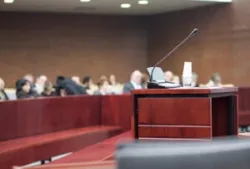
At your disability hearing, there will be a vocational expert, to help the judge understand how your limitations might affect your ability to work. Sometimes the vocational expert is in the room, and sometimes he is on the telephone. Though the vocational expert is often referred to as “doctor,” he is not a medical doctor. “Doctor” refers to his doctorate degree in vocational training.
In assessing whether you are disabled, the judge has to determine whether you are capable of performing your prior jobs (performed within the past fifteen years). The vocational expert can help him make that decision. If you cannot perform your past work, the burden of proof shifts to the government to show that there are some other occupations that you could perform. Without a vocational expert, they could not meet this burden of proof.
The expert may ask you a question or two about the work you performed in the past, but apart from that, you will not be expected to speak during this testimony.
Have You Been Injured In An Accident? Contact Pilzer Klein Law
864-235-0234Your lawyer will know the qualifications of the vocational expert. It would be extremely rare for a lawyer to object to allowing the vocational expert to testify, though the lawyer is given an opportunity to do so. Expect the vocational expert to be asked, first, how he classifies the jobs you have performed in the past. He will describe them in terms of their exertional demands, and their skill demands. If you hear numbers, that is a code from the Dictionary of Occupational Titles, which describes all of the jobs in the national economy, and how demanding they are. Sometimes the expert will distinguish between the demands of the job as described in the Dictionary of Occupational Titles, and the way it was actually performed by you.
He will then be asked whether any of the skills from your skilled jobs transfer into jobs that are less exertionally demanding. For example, a hospital nurse is classified as medium in exertion, and skilled. However, a person who knows how to be a nurse at the hospital might be capable of performing sedentary work on the telephone, advising people.
Contact our social security disability lawyers today
864-235-0234The expert is then asked questions called “hypotheticals.” These questions simply presume that you have a set of limitations. Normally, the first hypothetical from the judge assumes that the only limitations you have are the limitations that the Social Security Administration’s doctors admit that you have. This can be a very disconcerting question. You have just spent about 40 minutes explaining how limited you are, and now the judge is asking the expert to assume that you are not nearly as limited as you said you are. Please be calm at this point. The judge is not saying you are a liar, or saying that he believes that the person described in the question is really you. Naturally enough, the expert is likely to name some jobs that you could perform.
Complete a Free Case Evaluation form now
Contact UsWith each additional hypothetical, the limitations are scaled up. For example, the first one might ask the expert to assume that you can lift 50 pounds. The second one might ask the expert to assume that you can lift 20 pounds, the third might ask him to assume that you have to sit. One might ask him to assume that you can carry out only simple instructions. One might ask him to assume that you have difficulty sitting, or need to elevate your feet, or cannot concentrate, or cannot attend work on a regular basis.
Normally, the last hypotheticals asked produce testimony that you cannot work. Just as the first hypothetical does not mean you are going to lose, the last one does not mean you are going to win. The judge will have to decide which of the descriptions in the hypotheticals most closely applies to you.
Your lawyer may or may not cross-examine the vocational expert. He can ask his own hypotheticals, adding limitations that the judge excluded. He can challenge the consistency of the expert’s answers to information in the Dictionary of Occupational Titles. Normally, the expert’s answers to the questions are sensible enough; it is the questions that do not seem sensible. In other words, asked to assume that you can stand and walk all day and lift 50 pounds, an expert is likely to say that you could stock shelves. The answer is sensible enough, the problem is that the question does not describe you. Because the answer is sensible enough, your lawyer probably will not cross-examine aggressively on that testimony. He will ask his own questions, which describe you more accurately.
Sometimes, the questions that produce the “no work” answers are all asked by the judge. In that scenario, your lawyer might not ask the expert any questions. He will simply explain to the judge why the “no work” questions are supported by the evidence.
It is easy to overestimate the importance of the expert. The outcome of your case will not turn on what the vocational expert says. It will turn on how limited the judge thinks you are.
The most important thing to remember, is not to panic or be dismayed when the first question asks the expert to assume that you have hardly any limitations. That does not mean you are going to lose the case. After the hearing, your lawyer will answer any questions that you have about the vocational expert’s testimony.
Call or text 864-235-0234 or complete a Free Case Evaluation form


